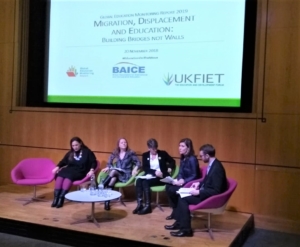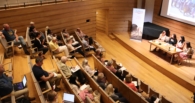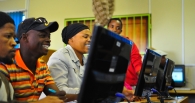Building bridges, not walls
Lessons from the 2019 Global Education Monitoring Report on migration and displacement
Christine Fenning
19 December 2018
/
- 0 Comments

Global Education Monitoring Report Launch. Photo by Christine Fenning
On 20 November 2018 the 2019 Global Education Monitoring (GEM) Report was launched in London at an event hosted by UKFIET, along with BAICE, with approximately 150 people attending. Other launch events happened on the same day in Berlin, Bangkok and Nairobi, with more events scheduled over the following few months.
The 2019 GEM is launched at a time when two international pacts are being finalized by the international community – the Global Compact for Safe, Orderly and Regular Migration, and the Global Compact on Refugees. It therefore appropriately focuses on migration and displacement.
The launch event was opened by Professor Freda Wolfenden, Executive Committee Chair for UKFIET, followed by Sébastien Hines, Research Consultant from the GEM Report Team, who presented key findings from the report (listen to the audio-recording here). The report’s main message is that people who are on the move around the world – whether by choice or not – never leave behind their right to education; therefore, education needs to adapt to their needs, so as to allow refugees and migrants the potential to transform both their own lives and those of host nations. The report is very clear that current laws and policies are failing migrant and refugee children by either negating or ignoring their needs; this in turn squanders a lot of human potential. The report makes a number of recommendations on how to address issues.
Two panels of experts discussed a number of the report’s issues and recommendations (listen to panel 1 discussion and panel 2 discussion). The panel discussions were moderated by Barbara Serra, news presenter and correspondent for Al Jazeera English.
The first panel focused on the practical challenges and solutions to including migrants and refugees in national education systems. On the panel were Emma Gremley, DFID Senior Education Adviser; Fadi Halliso, co-founder and CEO of Basmech & Zeitooneh, and Gulmakai Champion for the Malala Fund; Joseph Nhan-O’Reilly, Head of Education Policy & Advocacy at Save the Children; and Tejendra Pherali, Senior Lecturer in Education and International Development at University College London.
The second panel focused on strategies to foster an inclusive education system which helps migrants settle in new countries and environments. Speakers included Kiri Tunks, President of the National Union of Teachers section of the National Education Union, Emma Williams, CEO of Student Action for Refugees, and Andria Zafirakou, Teacher and 2018 Global Teacher Prize winner.
Sébastien Hines’ presentation of the GEM’s main messages raised many issues which the two panel discussions could really only touch upon in an afternoon. It is important to remember the framing of the launch within the 2030 Agenda which commits the international community to leave no one behind, and to ensure inclusive equitable quality education and promote lifelong learning opportunities for all. Hines outlined how (internal and international) migration and displacement interact with education: some of the issues are brain drain, unequal access to quality (early childhood) education, due to a number of reasons, such as remoteness, language obstacles, unqualified teachers, lack of resources, or lack of experience in responding to sudden influxes of people fleeing their country. On the other hand, migration and displacement also offer those who are fleeing, or are on the move for other reasons, refuge and education opportunities, e.g. migrants may be able to receive more years of education than if they had stayed in their home country or rural area.
The challenges faced both by migrants and refugees, as well as host populations, and the tensions between host and migrant/displaced populations were also discussed. The need for inclusive education to address causes of tension, help realise children’s potential and also support communities in migrants’ home countries, was evident, as was the need to ensure that there is enough provision and sufficient support from the international community to implement policies which often appropriately reflect countries’ commitments.
Education commitments are also included in the two global compacts on migrants and refugees. The GEM includes a number of recommendations as to how countries can fulfil these commitments towards migrants and refugees:
- Protect the right to education of migrants and displaced people
- Include migrants and displaced people in the national education system
- Understand and plan for the education needs of migrants and displaced people
- Represent migration and displacement histories in education accurately to challenge prejudices
- Prepare teachers of migrants and displaced people to address diversity and hardship
- Harness the potential of migrants and displaced people
- Support education needs of migrants and displaced people in humanitarian and development aid
It is, of course, well known that global funding for education does not yet reflect the priorities and commitments in the 2030 Agenda and in the two compacts. However, the work of funds such as Education Cannot Wait and the Global Partnership for Education shows that there is an increased realisation that education is key to achieving the international community’s commitment to leaving no one behind.
Besides the panel discussions, it was fascinating and refreshing to zoom in from the global development/aid perspective and look at the situation very practically from a teacher’s perspective. Andria Zafirakou, who teaches Art, spoke about the importance of those subjects where language plays much less of a role: refugee and migrant students can express themselves in Art, PE, music, and this makes it much easier for them to feel part of the local (school) community. She also more generally emphasised the importance of acknowledging who we have in front of us and of being aware of what the curriculum actually delivers. What we want for our countries should be reflected in the classroom. What do we want these students to be like, what skills and opportunities do we want them to have in our schools so they can give back to the economy and thrive in our country? It was encouraging to hear of a number of fantastic projects taking place in schools already.
Two of the key messages of the GEM launch event were, on the one hand, the incredible challenges that arise as a consequence of large-scale population movements, and on the other hand, the optimism arising from some very practical initiatives, as well as global agreements. And the reminder that: ‘Every person has the right to an education. Working together we must ensure that no one is left behind’.
You must be logged in to post a comment.



